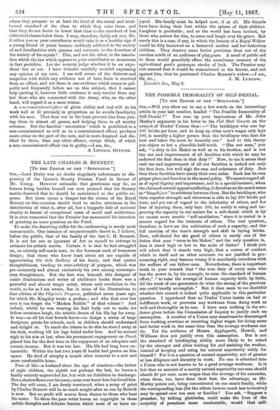THE LATE CHARLES H. BENNETT.
[To THE EDITOR OF THE "SPECTATOR."] Sra,—Lord Derby was no doubt singularly unfortunate in dis- pensing of the Queen's Bounty Pension Fund in favour of Mr. Young. However estimable that gentleman may be, no human being besides himself can now pretend that his literary merits deserved that he should be maintained at the public ex- pense. But there seems a danger lest the misuse of the Royal Bounty on this occasion should tend to undue strictness in the distribution of what is, after all, but a beggarly dole of national charity in favour of exceptional cases of merit and misfortune. It is even rumoured that the Premier has announced his intention of granting no more pensions on the Fund.
To make the deserving suffer for the undeserving is surely most unreasonable. One instance of unquestionable desert is, I believe, before the public, that of the family of the late C. H. Bennett. It is not for one as ignorant of Art as myself to attempt to estimate his artistic merits. Certain it is that he had struggled on, an entirely self-made man, to the foremost rank of humorous design ; that those who know least about art are capable of appreciating the rich drollery of his fancy, and that quaint • thoughtfulness, tending to over-subtlety of purpose, which was pm-eminently and almost exclusively his own among contempo- rary draughtsmen. But the fact was, beneath this designer of comic illustrations and writer of children's books there was a powerful and almost tragic artist, whose only revelation to the world, so far as I am aware, lies in some of his illustrations to that edition of the Pilgrim's Progress, published seven years ago, for which Mr. Kingsley wrote a preface ; and who that ever has seen it can forget the "Madam Bubble" of that volume ? And indeed, whilst he was wearing his frail body out to make his fellow-creatures laugh, the artistic dream of his life lay far away. It was—as all his beat friends know—to design a aeries of large Scripture prints for schools, such as children should understand and delight in. To reach the leisure to do this he slaved away at his desk, working till his legs failed under him. And he seemed nigh to his aim at last, when his permanent engagement on Punch placed him for the first time in the enjoyment of an adequate and certain income. But it was too late. His life had long been un- insurable. Within the last two years ill health had grown on him apace. He died of atrophy a month after removal to a new and more comfortable home.
Pure of life—a husband since the age of nineteen—the father of eight children, the eighth not perhaps the last, he leaves a family entirely unprovided for, but with no liabilities to discharge. Not a shadow flows over his name, none ever knew him but loved him. The day will come, I am firmly convinced, when a scrap of print by Charles Bennett will be as much sought after as one by Bewick is now. But no profit will accrue from thence to those who bear his name. To them the poor artist leaves no copyright in those subtle thoughts and delicate fancies which most of us have en-
joyed. His family must be helped now, if at all. His friends have been doing their beat within the sphere. of their abilities. Laughter is profitable ; and so the world has been invited, by those who sorrow for him, to come and laugh over his grave. But surely this is a case, if any, in which the bounty of a Royal Widow could be fitly bestowed on a bereaved mother and her fatherless children. They deserve some better provision than out of the careless mirth of an audience of playgoers. A meed of public aid to them would gracefully efface the unwelcome memory of the agricultural poet's grotesque stroke of luck. The Premier may
assured that it would be remembered in his favour, and not against him, that he pensioned Charles Bennett's widow.—I






























 Previous page
Previous page